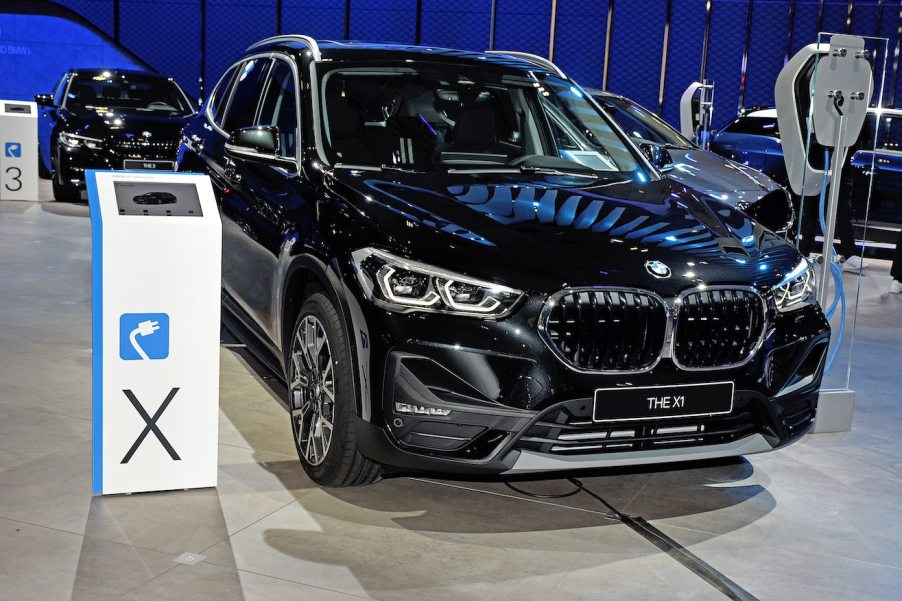
We’re Not Too Far Away From an Electric BMW X1
Crossovers are a popular SUV size these days. There are a number of gas, diesel, hybrid, and electric versions to choose from as well. That includes offerings from the luxury brands. BMW plans to add more electric models to its offerings over the next few years, and its smallest crossover SUV, the BMW X1, has now joined the list of upcoming all-electric vehicles.
BMW’s electrification plan
BMW aims to reduce carbon emissions produced by its vehicles and its factories. It has set a goal of producing 25 electric models by 2023, with half of those sold in Europe by 2030 as fully electric, according to Motor1. To help reach this goal, BMW recently announced it plans to offer fully electric versions of the BMW X1 and the 5 Series.
The two models join the 7 Series, whose electric version was announced in March, according to Car and Driver. BMW expects to have five electric vehicles available by the end of 2021. That includes the i3, i4, iX3, iNext, and Mini Cooper SE. The European Union’s tighter emissions regulations have prodded auto manufacturers to develop more electric vehicles as they aim for a 37.5 percent reduction from 2021 emissions levels by 2030.
The BMW X1’s EV competitors
The upcoming BMW X1 EV will be sold up against the Tesla Model Y, the Audi e-tron, and the Jaguar I-Pace. BMW has been one of the companies hurt by Tesla’s sales since both companies target luxury SUV buyers.
When looking at the Tesla Model Y and the Audi e-tron, the Model Y wins for both range and charging speed. However, the Audi e-tron offers more luxury and a higher price. According to InsideEVs, the 2020 Tesla Model Y has an estimated range of 291 miles. The 2021 Audi e-tron has an estimated range of 222 miles, and the 2020 Jaguar I-Pace has a range of 234 miles. All three have all-wheel drive.
Specs for the BMW X1 EV aren’t yet known to compare it with its rivals. However, according to CarBuzz.com, the electric X1 may have either a 38-kWh or a 76-kWh battery. The smaller option would provide a range of 115 miles, while the larger one would offer 190 miles.
There are non-luxury electric crossovers that are currently available too, including the Hyundai Kona Electric and the Kia Niro EV.
The 2020 BMW X1
The EV version of the BMW X1 will join other versions of the X1, including gasoline with a 48-volt electric system, diesel, and a new plug-in-hybrid version. The X1 xDrive25e, which is the plug-in hybrid, started delivery in Europe in March 2020.
The gas-powered BMW X1 is already a fuel-efficient vehicle. The X1 sDrive28i, which has front-wheel drive, is rated for 27 MPG overall, 24 MPG in the city, and 33 MPG on the highway. The X1 xDrive28i, which has all-wheel drive, is slightly lower at 26 MPG overall, 23 MPG in the city, and 31 MPG on the highway.
The 2020 BMW X1 has been awarded Car and Driver’s 10Best Award two years in a row. The X1’s engine is a turbocharged 2.0-liter four-cylinder, producing 228 hp. It’s paired with an eight-speed automatic transmission. It offers either front-wheel drive or all-wheel drive.
Car and Driver found the X1 to be spacious for passengers and cargo. Car and Driver says the interior of the X1 is “crafted from mostly premium materials,” although some areas look cheaper. The 2020 X1 has an 8.8-inch infotainment screen that is compatible with Apple CarPlay but not with Android Auto.
No information is available yet as to when the new BMW X1 EV will be available for buyers. It is expected to be called the BMW iX1, and early estimates suggest it may arrive at the end of 2022.


